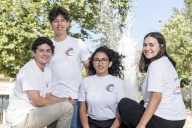You have /5 articles left.
Sign up for a free account or log in.
Ingrid J. Paredes is a Ph.D. candidate in chemical engineering at New York University. You can find her on Twitter @ingridjoylyn.
Another year, another recruiting season. For departments and senior graduate students, recruitment visits are full of excitement — visits are opportunities to highlight research and facilities available at your institution, share experiences about student life on your campus, and (if your institution is like mine)eat tons of free food.
For incoming students,however, recruitment visits can be daunting. You have to decide where to spend the next five years of your life based almost entirely on your first impressions of a department and its students. It’s a big commitment to make! Ultimately, the program you choose should best suit your needs, both academic and personal. I, for example, wanted to attend a university close to home. That’s something I wasn’t going to sacrifice, and while that excluded many programs from my list of schools to apply to, I knew the school I would end up attending would allow me to see my family as often as I would like.For someone else, location might not matter much compared to research opportunities.
What’s important is that you do your best to define what you want to get out of your program. I spoke to a few first year students in my department — Iver, Minh, and Steve — to see what their recruitment experiences were like and what guided their ultimate decision to pick our program.
The first thing the students said is they wanted to know about was graduate students’ relationships with one another and their social lives outside of lab hours. “I don’t expect to be working on my thesis research until I’m 60,” Steve said, for example. “If everyone seems to enjoy themselves and their time together, then I’d know I was in the right place.”For him, research was almost secondary to his decision to enroll in our program — what he wanted to know was whether or not he would enjoy the five years he would be committing to a place and its people.
Iver added that a sense of the students’ work-life balance, which has been tied to graduate students’ mental health, was important to him. The relationships that graduate students have to each other and their advisers really shows during the graduate visit, and he appreciated having the opportunity to candidly speak to graduate students. “Talking to people is the most important thing you can do,” he said. “[Our visit] was informal, with conversations happening over lunch and dinner, which was great — we got to get to know professors personally and learn from the students about their daily life.”
Mentorship and career development, were important for Minh. “Beyond research, what soft skills will you get? Think about the location — in NYC, for example, not just in the city but your adviser’s connections to companies and opportunities in the surrounding area.”
Overall, the students said that it’s important to arrive at the visit knowing your purpose for applying to the program. The free food is delicious, but like I said, it’s a first impression. Instead, think about how the students feel one, two, five years into the program. To help yourself answer these questions and make the most of your time during visits, ask students, faculty, and alumni as many questions you can. Professor Jay Bavel has a written great list of questions to ask about topics ranging from programs to funding and teaching.
With the answers you receive, prioritize what is important to you. Think about why you want to pursue a PhD, how your institution will help you achieve those goals, and most importantly, if time spent there will — as everyone’s saying lately — spark joy for the length of your time there.
Share your recruitment experiences with us by tweeting @GradHacker!
[Image by Flickr user NSLatUCB and used under a Creative Commons license.]








